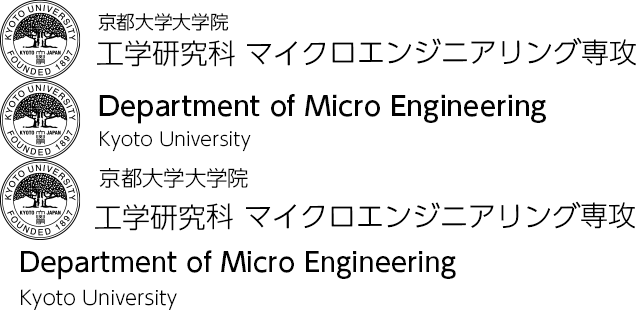Curriculum
Curriculums of the Group of Mechanical Engineering Departments
The Group of Mechanical Engineering Departments (Department of Mechanical Engineering and Science, Department of Micro Engineering, and the Department of Aeronautics and Astronautics) have developed a common curriculum among the three departments. Core subjects, which are closely related to each of the three disciplines, are offered. At the same time, other broad subjects considered important to each particular department are offered as development subjects. This system enables students to choose from a variety of subjects according to their field of specialization and personal interests.
English-language lectures
Two subjects, "Introduction to Advanced Mechanical Systems", and "Advanced New Industrial Materials", are taught in English as a series of lectures by several academic staff. In addition, the doctoral program subject, "21st Century Center of Excellence for Research and Education on Complex Functional Mechanical Systems, A-F," which was launched in the 21st Century COE Program of the Group of Mechanical Engineering Departments. All the presentations and discussions in this subject are conducted in English.
Master's Program curriculum
The requirements for completion of a Master's program (earning 30 or more credit points) are to pass at least five core subjects/10 credit points (out of a selection 8 subjects/16 credit points) in addition to the compulsory subjects, "Special Experiments and Exercises 1 & 2" (5 credit points per subject), run by each department. The development subject category includes internship subjects as well as subjects that give students the opportunity to learn about technology in the real world—for example learning about R&D, design, production, management, and intellectual property by working at a company. We also invite lecturers from other organizations, such as corporations and research institutes. And to monitor the progress of research ("Special Experiments and Exercises 1 & 2") by Master's students we arrange mid-term presentations by the start of the second year of the program to provide detailed guidance by several academic staff.
Doctoral Program curriculum
The completion requirements for the doctoral program are at least 6 credit points (or at least 10 for students enrolling from 2008), even for students admitted to the program under a special scheme for mature-age students. There is also a provision to shorten the time required to earn a doctorate, dependent on research performance. The length is particularly flexible for specially selected mature-age students in the second stage of a doctoral program. In addition, we are actively setting up the Integrated Masters-Doctoral Program, to keep pace with educational program innovations in the Graduate School of Engineering.
Cooperation Chairs
Seven labs that belong to the Institute for Life and Medical Sciences, the Innovative Collaboration Center, and the Kyoto University Research Reactor Institute are collaborating closely with the three departments of the Group of Mechanical Engineering Departments, to offer cooperation courses. The purpose is to distribute the education and research activities of graduate students from the three departments among these labs. In addition, through joint use of the research facilities at Advanced Engineering Research Centers in the Katsura Int'tech Center, and the Venture Business Laboratory (VBL) , students are able to enjoy richer educational and research experiences. Also, in the area of collaborative education in the fields of medicine and engineering at the Nano-medicine Merger Education Unit, which was established in 2006, the faculties of the Group of Mechanical Engineering Departments are teaching courses on nanodevices.
